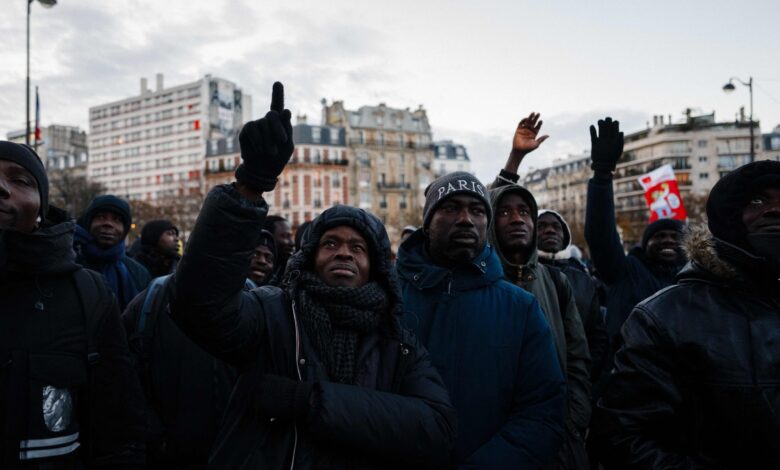Diens immigratiewet is door links en extreemrechts getorpedeerd

Immigration laws, often at the center of political discourse, wield significant influence over societal dynamics and cultural integration. Among these laws, diens immigratiewet stands out, its trajectory often intersecting with the currents of political ideologies. Understanding the nuances of this legislation requires delving into its historical context, examining its contemporary implications, and forecasting its future trajectory.
Understanding diens immigratiewet
diens immigratiewet, a cornerstone of immigration policy, embodies the legal framework governing immigration procedures and criteria. Its primary objectives include regulating the influx of migrants, ensuring national security, and managing demographic shifts. Embedded within its provisions are mechanisms for visa issuance, residency permits, and citizenship pathways, all aimed at balancing humanitarian concerns with national interests.
History of immigration laws
The evolution of immigration laws reflects the shifting paradigms of governance and societal values. From early exclusionary policies rooted in nativism to modern-day efforts to foster diversity and inclusivity, legislative frameworks have undergone profound transformations. Each era’s political ideologies have left indelible imprints on immigration laws, shaping attitudes towards migrants and influencing policy agendas.
Impact of political ideologies on immigration laws
The diens immigratiewet landscape is profoundly shaped by the ideological spectrum, with liberal and conservative viewpoints offering contrasting perspectives on migration. While liberal camps advocate for compassionate immigration policies, emphasizing inclusivity and asylum rights, conservative factions prioritize border security and stringent entry criteria. These divergent approaches often spark contentious debates and policy gridlocks, underscoring the polarizing nature of immigration discourse.
Recent controversies
In recent years, diens immigratiewet has become a lightning rod for controversy, embroiled in heated debates fueled by partisan politics and societal anxieties. Issues such as border enforcement, refugee resettlement, and the legal status of undocumented immigrants have stirred public outcry and triggered policy upheavals. High-profile court battles and executive orders have further intensified the debate, amplifying the voices of advocacy groups and civil rights organizations.
Effects on immigrant communities
The impact of diens immigratiewet reverberates throughout immigrant communities, shaping their socio-economic prospects and cultural assimilation experiences. Heightened enforcement measures, coupled with restrictive policies, often exacerbate vulnerabilities among marginalized groups, fostering feelings of alienation and disenfranchisement. Despite these challenges, immigrant communities remain resilient, mobilizing grassroots efforts to navigate legal obstacles and foster solidarity.
Legal challenges and court rulings
Legal challenges serve as pivotal battlegrounds in the struggle for immigration reform, with courts wielding significant influence over policy outcomes. Landmark rulings on DACA, asylum eligibility, and executive orders have reshaped the legal landscape, upholding constitutional principles while safeguarding immigrants’ rights. However, judicial interpretations remain subject to political scrutiny, highlighting the precarious nature of legal protections in an era of partisan strife.
Public perception and media portrayal
Media narratives play a pivotal role in shaping public attitudes towards immigration, framing complex issues through partisan lenses and ideological prisms. News coverage often amplifies sensationalism and perpetuates stereotypes, fueling xenophobic sentiments and stoking fears of demographic change. However, alternative media outlets and grassroots campaigns strive to counterbalance negative narratives, advocating for empathetic portrayals of migrants and challenging prevailing biases.
Advocacy and activism
Amidst the cacophony of political rhetoric, advocacy groups and grassroots movements emerge as catalysts for change, mobilizing communities and amplifying marginalized voices. From nationwide protests to local outreach initiatives, these efforts seek to humanize the immigration debate, championing compassionate policies and challenging systemic injustices. Through strategic litigation and community organizing, activists pave the way for substantive reforms, driving the agenda towards inclusivity and equity.
Future outlook
As diens immigratiewet continues to evolve in response to shifting political winds and societal dynamics, the future of immigration policy remains uncertain yet hopeful. While entrenched divisions persist, signs of bipartisan cooperation and public sentiment shifts offer glimmers of progress. By fostering dialogue, cultivating empathy, and advocating for evidence-based solutions, stakeholders can chart a path towards a more equitable and humane immigration system, grounded in principles of justice and solidarity.
FAQs
What is diens immigratiewet and why is it controversial?
- diens immigratiewet is a crucial piece of legislation governing immigration policies, but it often sparks controversy due to its impact on national security and humanitarian concerns.
How do political ideologies influence immigration laws?
- Political ideologies shape attitudes towards migration, with liberal and conservative viewpoints offering contrasting perspectives on border security, asylum rights, and citizenship pathways.
What are some recent legal challenges regarding diens immigratiewet?
- Recent legal battles have centered on issues such as DACA, asylum eligibility, and executive orders, highlighting the judiciary’s role in shaping immigration policy.
How does media portrayal affect public perception of immigration?
- Media narratives often perpetuate stereotypes and fuel xenophobic sentiments, influencing public attitudes towards immigrants and shaping policy debates.
What role do advocacy groups play in immigration reform?
- Advocacy groups and grassroots movements mobilize communities, amplify marginalized voices, and advocate for compassionate immigration policies through litigation and grassroots organizing.
What does the future hold for immigration policy?
- The future of immigration policy remains uncertain, but signs of bipartisan cooperation and public sentiment shifts offer hope for substantive reforms towards a more equitable and humane system.
Conclusion
In navigating the complexities of diens immigratiewet, it becomes evident that immigration policy is more than just a legal framework—it’s a reflection of societal values, political ideologies, and human aspirations. By fostering dialogue, challenging biases, and advocating for inclusive policies, we can collectively shape a future where immigration is viewed not as a threat, but as an opportunity for growth, diversity, and mutual understanding.





